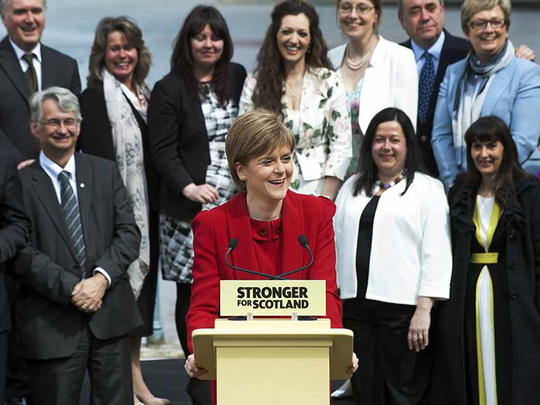
EDINBURGH, Scotland: Growing up in a former mining area in western Scotland, Nicola Sturgeon ordinarily would have been expected to join the Labour Party in one of its heartlands.
Instead, she embraced the pro-independence Scottish National Party as a teenager. At the age of 44, she just led it to an election victory even she couldn’t have dreamed of when she set off on her political journey.
The SNP took an unprecedented 56 of Scotland’s 59 seats in the British Parliament, five times its previous best result, setting the stage for Sturgeon to press for the next government to cede more power to the country and still risk a repeat of September’s independence referendum. With the SNP more than quadrupling membership since then and Scottish parliamentary elections due in 2016, the 55 per cent of voters who opted to remain in the UK may not be relied on to do so again.
“A great leader is someone who unites people,” said Matt Qvortrup, professor of politics at Cranfield University in England who specialises in constitutional change. “She has that effortless ease of greatness. Either you have it or you don’t.”
Since replacing Alex Salmond, 60, to become the first female leader of Scotland’s semi-autonomous government in Edinburgh, Sturgeon has helped turn the SNP into a movement and cement its position as the party of choice for an electorate rarely more politically engaged.
While he became the lightning rod for the party’s opponents in England, she galvanised support and her performances in televised debates won plaudits across Britain even though she wasn’t standing for a seat.
“You can demonise me, of course, but Nicola Sturgeon?” Salmond said in an interview this week in the Aberdeenshire district he now will represent in the British Parliament. “You can’t be serious. It’s absurd.”
After Salmond stepped down officially in November, she named a Cabinet made up half of women and the SNP put up female candidates for Thursday’s election who had played key roles in the Yes Scotland referendum campaign. Mhairi Black, a Glasgow University student, became the youngest British Member of Parliament in modern history at the age of 20.
Born in Irvine in Ayrshire in 1970, Sturgeon went to school in the town before graduating in law from Glasgow University and working at an advice center in Drumchapel, one of the city’s toughest neighbourhoods. She was elected to the Scottish Parliament in 1999 when the then Labour government re-established it after almost 300 years.
She rose up the party ranks and was appointed by Salmond after the SNP won the 2007 Scottish parliamentary election to the post of secretary for health and his deputy. While in that job she handled the scare over swine flu.
Her rationale for pursuing full autonomy for Scotland was that under the UK system, the country didn’t get the governments it voted for at least half of her lifetime. With Conservative Prime Minister David Cameron forming another government, she finds herself in that position again. This time, though, with power to act.
“I’m bitterly disappointed we’re looking at another Conservative government,” Sturgeon said in an interview with ITV television in Glasgow. “It’s all the more important that we’ve got strong SNP MPs standing up for Scotland and fighting Scotland’s corner. We will seek to use our substantial influence we now have in the House of Commons.”
— Washington Post












